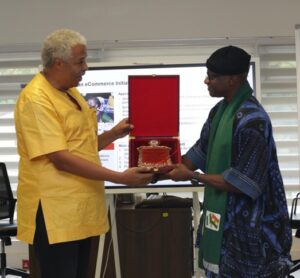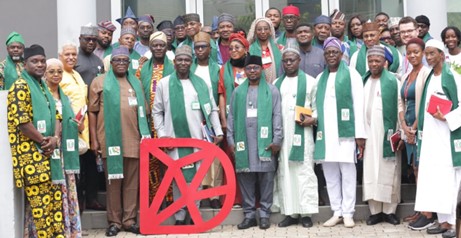The Nigerian National Institute for Policy and Strategic Studies (NIPSS) delegation visited GIZ Ghana’s Digital Transformation Center (DTC), to understudy the digital economy and youth empowerment initiatives.
The NIPSS, a statutory entity, that trains high-level policymakers and executors in Nigeria, has made direct and regular contributions to the Nigerian national policy process by initiating and evaluating various policy initiatives and strategies.
The DTC, in Ghana, is a cluster of digital economic projects implemented by the Deutsche Gesellschaft für Internationale Zusammenarbeit (GIZ) GmbH, on behalf of the German Federal Ministry for Economic Cooperation and Development (BMZ). It is a local implementation partner of Ghana’s Ministry of Communications and Digitalisation (MoCD).
The mission, which focused on the theme: “Digital Economy, Youth Empowerment, and Sustainable Job Creation,” sought to encourage knowledge sharing between NIPSS and DTC Ghana on digital transformation, innovation, and matters concerning policies in the digital ecosystem.

The two NIPSS cohorts of senior executives were hosted by the Ministry of Communication and Digitalisation (MoCD) after which they took time to visit the Digital Transformation Center.
The delegation was led by the Director of Administration at NIPSS, Suleiman Muhannad Kabir, and included government officials, technocrats, academics and civil society representatives from Nigeria.
The delegation was well received by the Head of Project for DTC Ghana, David Robert and the DTC team. Mr. Robert gave a comprehensive overview of activities the DTC project is executing, especially in the areas of digitalisation, women empowerment, innovation and policy work.
The GIZ’s Invest for Jobs project shared a brief overview of its job creation efforts in collaboration with local partners. This initiative is one of the key strategies by the German Development Corporation to support sustainable economic development in Ghana.
Presenting during the visit, Mr. Robert said: “Digital transformation is an essential vehicle to a modern Africa. In Ghana, the DTC Project works with the Ministry and key partners to achieve this goal.”
The delegation expressed keen interest in some best practices adopted by DTC in ensuring the sustainability of its initiatives and projects. Other areas of interest were cross-border trade and e-commerce concerning the African Continental Free Trade Area (AfCFTA) agreement being implemented across Africa.
Further discussions centered on working with government and policymakers within the digital ecosystem. This was done, highlighting the importance of continuously engaging policy structures in making informed decisions when executing development-oriented projects within the sub-region.
The visit concluded with the delegation expressing their gratitude for the opportunity to have learned from the project and promised to reflect on these insights back in Nigeria. The Digital Transformation Center, Ghana is committed to building an inclusive digital society for all.
About the Digital Transformation Center, Ghana.
The Digital Transformation Center Ghana is funded by the German Federal Ministry for Economic Cooperation and Development (BMZ) and implemented by the Deutsche Gesellschaft für Internationale Zusammenarbeit (GIZ) GmbH, together with our local partners, to empower people to use digital tools and skills in their business and promote economic growth and decent jobs for all.
The Digital Transformation Center, Ghana combines expertise for capacity strengthening from four different Programmes, thus:
- Enabling an environment for micro-enterprises to use digital transformation to strengthen their economic situation and enabling intermediaries to do training and coaching for female entrepreneurs with Digital Transformation for Inclusive Entrepreneurship (DTEG)
- E-commerce training that supports small and medium enterprises in bringing their business online and reaching more customers with the Pan-African E-Commerce Initiative (PeCI).
- Developing policy frameworks and providing access to data, training and A.I technologies with FAIR Forward.
- Co-creating strong foundations for innovation by empowering African innovation Ecosystems with Make-IT in Africa.










